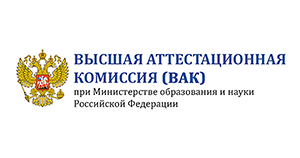|
Перейти
на сайт журнала "Врач" |
Перейти на сайт журнала "Медицинская сестра"
|
Перейти на сайт журнала "Фармация"
|
Перейти на сайт журнала "Молекулярная медицина"
|
Перейти на сайт журнала "Вопросы биологической, медицинской и фармацевтической химии"
|
Журнал включен в российские и международные библиотечные и реферативные базы данных
|
ВАК (Россия)
|
РИНЦ (Россия)
|
Эко-Вектор (Россия)
|
COUPLING FEATURES OF INTESTINAL AND SERUM INDOLE POOLS IN OBESITY
DOI: https://doi.org/10.29296/25877313-2021-10-01
Issue:
10
Year:
2021
Relevance. It is known that indole and its derivatives are formed in the intestine from tryptophan and, entering the host's body, play both a local regulatory role and a systemic effect on the body. Purpose of the study. To assess the relationship between the content of various metabolites of tryp-tophan metabolism in feces and blood serum in healthy individuals and in obese patients. Material and methods. We examined 266 patients with an average age of 39.9 ± 4.2 years, of which 138 were conditionally healthy, the rest were obese. The concentrations of metabolites in blood and feces were determined using the HPLC method. Results. We found that in both healthy and obese patients there is a statistically significant direct correlation between the concentration of indole-3-propionate in feces and blood. Whereas in obese patients, there is a statistically significant positive relationship between the content of indole-3-acetate in feces and serum. At the same time, in healthy patients, the levels of indole-3-acetate and anthranilic acid in feces are interrelated, which may indi-cate that indole-3-acetate is normally partially converted by microorganisms into anthranilic acid. A decrease in the formation of indole-3-acetate from anthranilic acid in obese patients and, as a consequence, an increase in the absorption of indole-3-acetate and an increase in it in the blood may have a compensatory-adaptive mechanism that protects against extra-adipocytic deposition of neutral fats.
Keywords:
obesity
indole-3-propionate
indole-3-acetate
anthranilic acid
kynurenine
References:
- Zhang J., Guo Z., Xue Z., et al. A phylo-functional core of gut microbiota in healthy young Chinese cohorts across lifestyles, geography and ethnicities. ISME. J. 2015; 9: 1979–90; doi: 10.1038/ismej.2015.11.
- Agus A., Planchais J., Sokol N. Gut Microbiota Regulation of Tryptophan Metabolism in Health and Disease. Cell Host. Microbe. 2018; 6: 716–24; doi: 10.1016/j.chom.2018.05.003.
- Osadchiy V., Labus J.S., Gupta A., et al. Correlation of tryptophan metabolites with connectivity of extended central reward network in healthy subjects. PLoS. One. 13; 8: e0201772; doi: 10.1371/journal.pone.0201772.
- Wang S.Z., Yu Y.J., Adeli K. Role of Gut Microbiota in Neu-roendocrine Regulation of Carbohydrate and Lipid Metabolism via the Microbiota-Gut-Brain-Liver Axis. Microorganisms. 2020; 8(4): 527; doi: 10.3390/microorganisms8040527.
- Zhao Z.H., Xin F.Z., Xue Y. Indole-3-propionic acid inhibits gut dysbiosis and endotoxin leakage to attenuate steatohepatitis in rats. Exp. Mol. Med. 2019; 51(9): 1–14; doi: 10.1038/s12276-019-0304-5.
- Knudsen C., Neyrinck A.M., Lanthier N., et al. Microbiota and nonalcoholic fatty liver disease: promising prospects for clinical interventions? Curr. Opin. Clin. Nutr. Metab Care 2019; 22(5): 393-400; doi: 10.1097/MCO.0000000000000584.
- Krishnan S., Ding Y., Saedi N., et al. Gut microbiota-derived tryptophan metabolites modulate inflammatory response in hepa-tocytes and macrophages. Cell Rep. 2018; 23(4): 1099–1111.
- Wong C.B., Tanaka A., Kuhara T., et al. Potential effects of indole-3-lactic acid, a metabolite of human bifidobacteria, on NGF-induced neurite outgrowth in PC12 cells. Microorganisms. 2020; 8(3): 1099–1111; doi: 10.1016/j.celrep.2018.03.109.
- Koay Y.C., Wali J.A., Luk S., et al. Ingestion of resistant starch by mice markedly increases microbiome-derived metabolites. FASEB J. 2019; 33(7): 8033–42; doi: 10.1096/fj.201900177R.
- Zhang L.S., Davies S.S. Microbial metabolism of dietary components to bioactive metabolites: opportunities for new therapeutic interventions. Genome Med. 2016; 8(1): 46; doi: 10.1186/s13073-016-0296-x.
- www.genome.gp – KEGG Pathway – Tryptophan metabolism.
- Shestopalov A.V., Shatova O.P., Gaponov A.M., et al. The study of tryptophan metabolite concentrations in blood serum and fecal extracts from obese children. Biomed. Khim.; 66(6): 494–501; doi: 10.18097/PBMC20206606494.
- Santos-Paulo S., Costello S., Forster S., et al. The gut microbiota as a therapeutic target for obesity: a scoping review. Nutr. Res. Rev. 2021; 8: 1–33; doi: 10.1017/S0954422421000160.
- Sitkin S.I., Tkachenko E.I., Vakhitov T.Y. Metabolic dysbiosis of the gut microbiota and its biomarkers. Eksp. Klin. Gastroenterol. 2016; 12(12): 6–29.
- Gaponov A.M., Volkova N.I., Ganenko L.A. Osobennosti mikrobioma tolstoj kishki u patsientov s ozhireniem pri ego razlichnyh fenotipat. Zhurnal mikrobiologii, epidemiologii i immunobiologii. 2021; 98(2): 144–155; doi:10.36233/0372-9311–66 (Gaponov A.M., Volkova N.I., Ganenko L.A. Osobennosti mikrobioma tolstoj kishki u pacientov s ozhireniem pri ego razlichnyh fenotipat. Zhurnal mikrobiologii, jepidemiologii i immunobiologii. 2021; 98(2): 144–155; doi:10.36233/0372-9311–66).
- Comai S., Bertazzo A., Brughera M. Tryptophanin health and disease. Adv. Clin. Chem. 2020; 95: 165–218; doi: 10.1016/bs.acc.2019.08.005.
- Wu S., Liu J., Liu C., et al. Quorum sensing for population level control of bacteria and potential therapeutic applications. Cell Mol. Life Sci. 020; 77(7): 1319–43; doi: 10.1007/s00018-019-03326-8.
- Dehhaghi M., Kazemi P.H., Shariat, et al. Microorganisms, tryptophan metabolism, and kynurenine pathway: a complex interconnected loop influencing human health status. Int. J. Tryptophan. Res. 2019; 12: 1178646919852996; doi: 10.1177/1178646919852996.








